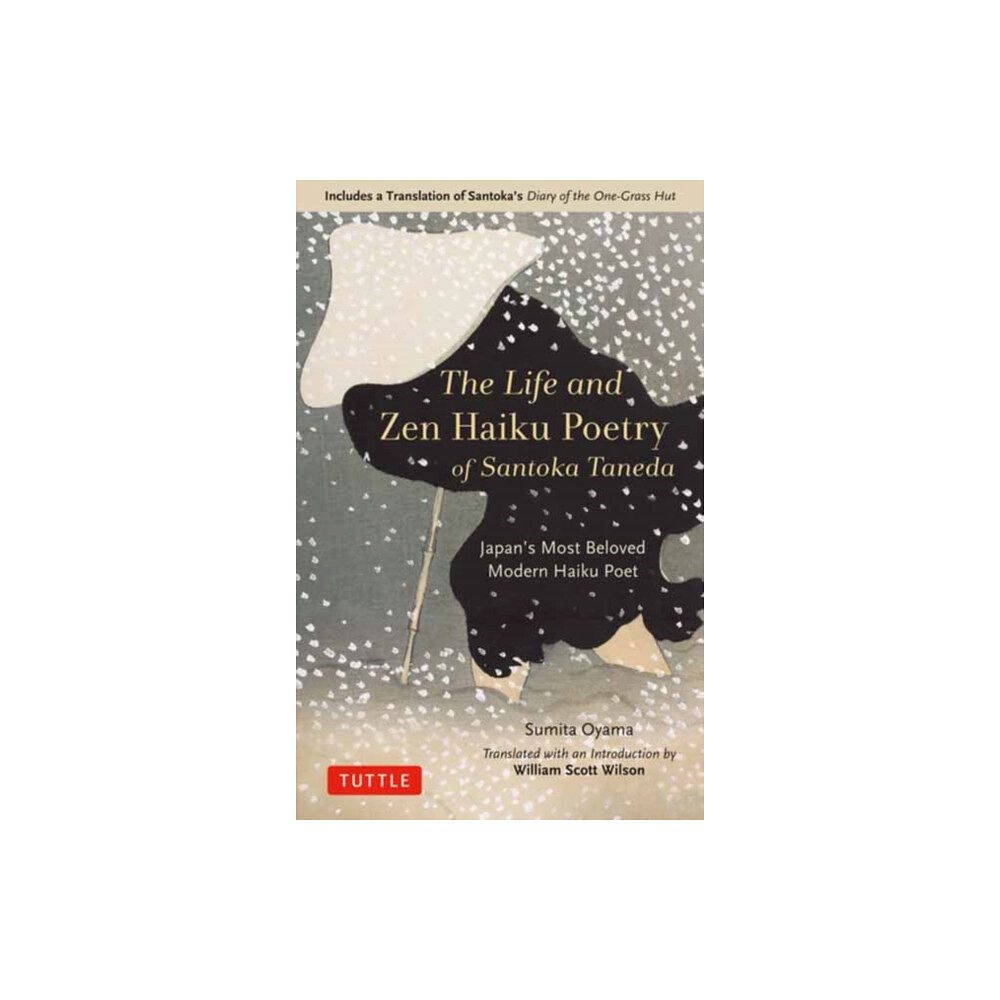- Hem
- Böcker
- Facklitteratur
- Biografier
- The Life and Zen Haiku Poetry of Santoka Taneda (häftad, eng)

The Life and Zen Haiku Poetry of Santoka Taneda (häftad, eng)
The fascinating and quirky biography of a disheveled poet, skillfully interwoven with his original works. Zen monk Santoka Taneda (1882-19...
249 kr
Bara 2 kvar
Skickas inom 4 - 5 vardagar
- Fri frakt
Just nu: Fri frakt på alla köp
Snabb leverans
Alltid låga priser
Produktbeskrivning
The fascinating and quirky biography of a disheveled poet, skillfully interwoven with his original works. Zen monk Santoka Taneda (1882-1940) is one of Japan's most beloved modern poets, famous for his "free-verse" haiku, the dominant style today. This book tells the fascinating story of his life, liberally sprinkled with more than 300 of his poems and extracts from his essays and journals—compiled by his best friend and biographer Sumita Oyama and elegantly translated by William Scott Wilson.
Santoka was a literary prodigy, but a notoriously disorganized human being. By his own admission, he was incapable of doing anything other than wandering the countryside and writing verses. Although Santoka married and had a son, he devoted his life to poetry, studying Zen, drinking sake and wandering the length and breadth of the Japanese islands on foot, as a mendicant monk.
The poet's life alternated between long periods of solitary retreat and restless travel, influenced by his tragic childhood. When not on the road, he lived in simple grass huts supported by friends and family. Santoka was a lively conversationalist who was often found so drunk he could only make it home with the help of a friendly neighbor or passerby.
But above all, throughout his life, he wrote constantly; poetry and essays flowed from him effortlessly. Santoka's eccentric style of haiku is highly regarded in Japan today for being truly modern and free from formal constraints. His journals and essays are equally thought-provoking—the musings of an unkempt but supremely self-conscious mind on everything from writing to cooking rice and his failure to live a more orderly life.
This translation and its introduction are by best-selling author William Scott Wilson, whose other works include The Book of Five Rings and The Lone Samurai. Wilson provides sensitive renditions of the haiku illustrating Santoka's life as well as an extensive introduction to the influences on Santoka's work, from contemporary haiku poets and his Buddhist teachers.
Alongside the book, readers have access to a two-hour online audio recording of 331 of Santoka Taneda's haiku, read in Japanese by a native speaker, and in English.
Santoka was a literary prodigy, but a notoriously disorganized human being. By his own admission, he was incapable of doing anything other than wandering the countryside and writing verses. Although Santoka married and had a son, he devoted his life to poetry, studying Zen, drinking sake and wandering the length and breadth of the Japanese islands on foot, as a mendicant monk.
The poet's life alternated between long periods of solitary retreat and restless travel, influenced by his tragic childhood. When not on the road, he lived in simple grass huts supported by friends and family. Santoka was a lively conversationalist who was often found so drunk he could only make it home with the help of a friendly neighbor or passerby.
But above all, throughout his life, he wrote constantly; poetry and essays flowed from him effortlessly. Santoka's eccentric style of haiku is highly regarded in Japan today for being truly modern and free from formal constraints. His journals and essays are equally thought-provoking—the musings of an unkempt but supremely self-conscious mind on everything from writing to cooking rice and his failure to live a more orderly life.
This translation and its introduction are by best-selling author William Scott Wilson, whose other works include The Book of Five Rings and The Lone Samurai. Wilson provides sensitive renditions of the haiku illustrating Santoka's life as well as an extensive introduction to the influences on Santoka's work, from contemporary haiku poets and his Buddhist teachers.
Alongside the book, readers have access to a two-hour online audio recording of 331 of Santoka Taneda's haiku, read in Japanese by a native speaker, and in English.
| Format | Häftad |
| Omfång | 352 sidor |
| Språk | Engelska |
| Förlag | Tuttle Publishing |
| Utgivningsdatum | 2021-03-09 |
| ISBN | 9784805316559 |
Specifikation
Böcker
- Format Häftad
- Antal sidor 352
- Språk Engelska
- Utgivningsdatum 2021-03-09
- ISBN 9784805316559
- Förlag Tuttle Publishing
Leverans
Vi erbjuder flera smidiga leveransalternativ beroende på ditt postnummer, såsom Budbee Box, Early Bird, Instabox och DB Schenker. Vid köp över 399 kr är leveransen kostnadsfri, annars tillkommer en fraktavgift från 39 kr. Välj det alternativ som passar dig bäst för en bekväm leverans.
Betalning
Du kan betala tryggt och enkelt via Avarda med flera alternativ: Swish för snabb betalning, kortbetalning med VISA eller MasterCard, faktura med 30 dagars betalningstid, eller konto för flexibel delbetalning.
Specifikation
Böcker
- Format Häftad
- Antal sidor 352
- Språk Engelska
- Utgivningsdatum 2021-03-09
- ISBN 9784805316559
- Förlag Tuttle Publishing
